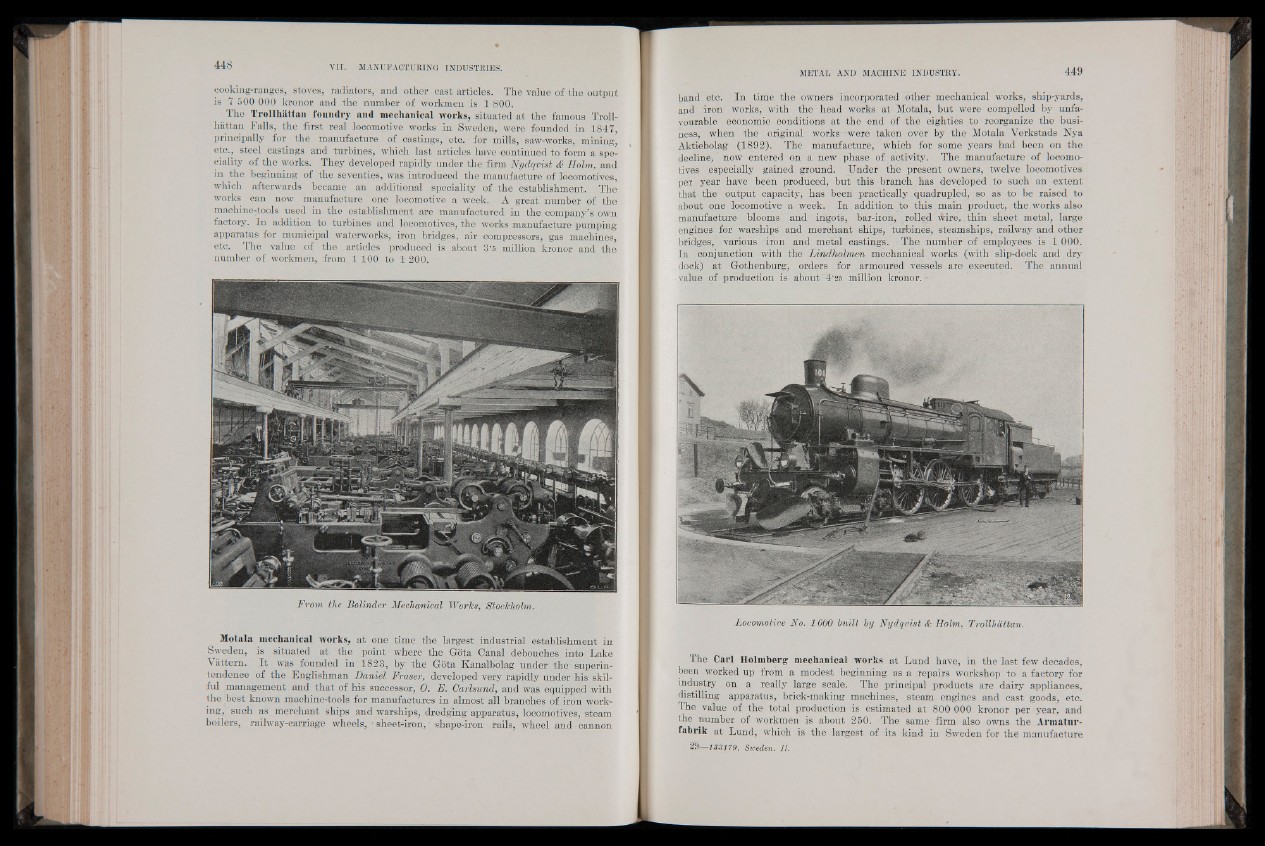
cooking-ranges, stoves, radiators, and other east articles. The value of the output
is 7 500 000 kronor and the number of workmen is 1 800.
The Trollhattan foundry and mechanical works, situated at the famous Trollhattan
Falls, the first real locomotive works in Sweden, were founded in 1847,
principally for the manufacture of castings, etc. for mills, saw-works, mining,
etc., steel .castings and turbines, which last articles have continued to form a speciality
of the works. They developed rapidly under the firm Nydqvist & Holm, and
in the beginning of the seventies, was introduced the manufacture of locomotives,
which afterwards became an additional speciality of the establishment. The
works can now manufacture one locomotive a week. A great number of the
machine-tools used in the establishment are manufactured in the company’s own
factory. In addition to turbines and locomotives, the works manufacture pumping
apparatus for municipal waterworks, iron bridges, air compressors, gas machines,
etc. The value of the . articles produced is about 3 *o million kronor and the
number of workmen, from 1 100 to T 200.
From , the BoUnder Mechanical Works, Stockholm.
Mótala mechanical works, at one time the largest, industrial establishment in
Sweden, is situated at the point where the Gota Canal debouches into Lake
Vattern. It was founded in 1823, by the Gôta Kanalbolag under the superintendence
of the Englishman Daniel Fraser, developed very rapidly under his skilful
management and that of his successor, O. B. Carlsund, and was equipped with
the best known machine-tools for manufactures in almost all branches of iron working,
such as merchant ships and warships, dredging apparatus, locomotives, steam
boilers, railway-carriage wheels, ■ sheet-iron, ■ shape-iron rails, wheel and cannon
band etc. In time the owners incorporated other mechanical works, ship-yards,
and iron works, with the head works at Motala, but were compelled by unfavourable
economic conditions at the end of the eighties to reorganize the business,
when the original works—were taken over by the Motala Yerkstads Nya
Aktiebolag (1892). The manufacture, which for some years had been on the
decline, now entered on a new phase of activity. The manufacture of locomotives
especially gained ground. Under the present owners, twelve locomotives
per year have been produced, but this branch has developed to such an extent
that the output capacity, has been practically quadrupled, so as to be raised to
about one locomotive a week. In addition to this main product, the works also
manufacture blooms and ingots, bar-iion, rolled \frire, thin sheet metal, large
engines for warships and merchant ships, turbines, steamships, railway and other
bridges, various iron and metal castings. The number of employees is 1 000.
In conjunction with the Lindholmen mechanical works (with slip-dock and dry
dock) at Gothenburg, orders for , armoured vessels are executed. The annual
value of production. is about 4 ‘26 million kronor. -
Locomotive No. 1000 built by Nydqvist & Holm, Trollhattan.
The Carl Holinberg mechanical works at Lund have, in the last few decades,
been worked up from a modest beginning as a repairs workshop to a factory for
industry on a really large scale. The principal products are dairy appliances,
distilling apparatus, brick-making machines, steam engines and cast goods, etc.
The value of the total production is estimated at 800 000 kronor per year, and
the number of workmen is about 250. The same firm also owns the Armatur-
fabrik at Lund, which is the largest of its kind in Sweden for the manufacture
29—133179. Sweden. II.